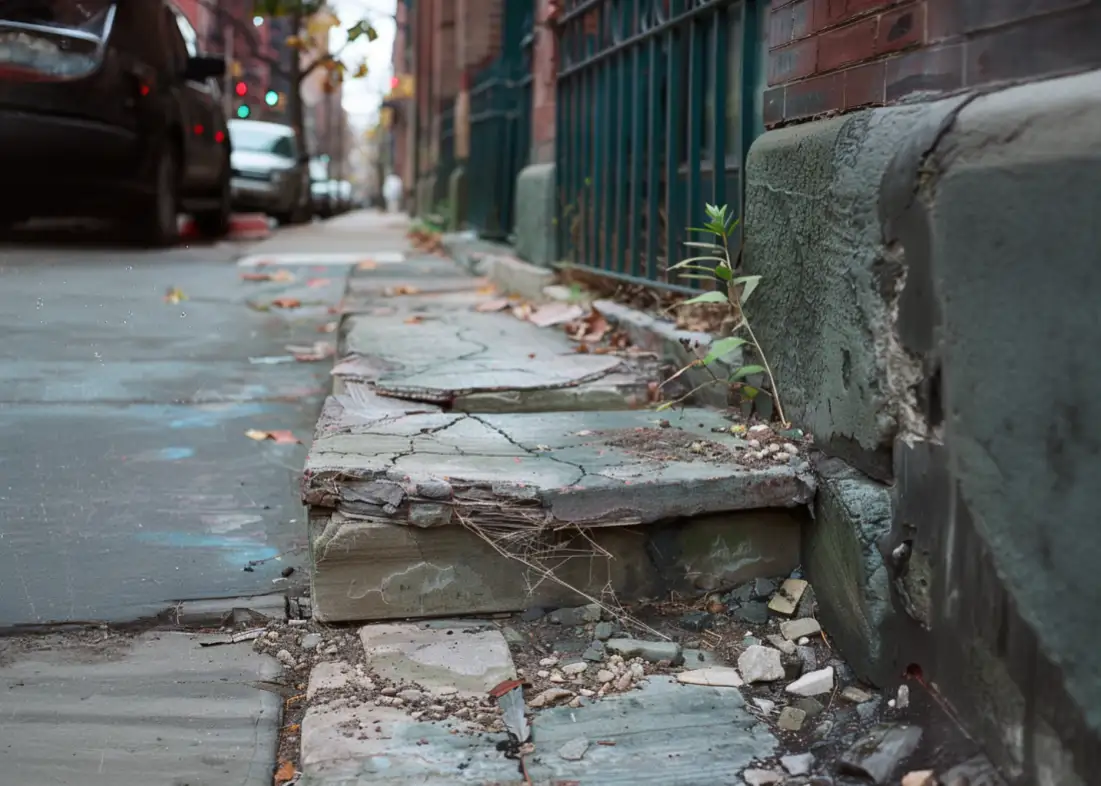Legal options for Philadelphia residents injured on dangerous surfaces

Philadelphia’s aging infrastructure has resulted in increased potholes and sinkholes. Poor maintenance of sidewalks and parking lots can also lead to injury.
“It looks like a meteorite hit it” is how James Stuckey, a deliveryman in Philadelphia, recently described a sinkhole to WHYY radio that appeared in Philadelphia’s Kensington neighborhood in August.
His experience is not unique. There an estimated 2,000 sinkholes in Philadelphia, which is about one for every mile of road.
Were you injured because of a dangerous, unmaintained road or sidewalk?
If you suffered a car accident, biking accident, or otherwise received an injury because of a pothole or sinkhole, you may be wondering about your legal options. A sinkhole or pothole can cause significant injury. Sinkholes can be large, sometimes deeper than a person is tall. If the city fails to warn people of a known sinkhole or fails to correct the sinkhole in a timely matter, then it is possible to be successful in a personal injury lawsuit against the city.
Basic overview of sovereign immunity and lawsuits against Philadelphia
It can be difficult to be successful in a personal injury lawsuit against the city, although it is possible. Generally, the federal government, the Commonwealth, and city governments are immune from civil lawsuits (called “sovereign immunity”). There are exceptions to this, however. Under a Pennsylvania law, a Commonwealth agency can claim immunity for injuries caused by potholes and sinkholes, unless the dangerous condition:
- Created a “reasonably foreseeable risk of the kind of injury which was incurred”
- The Commonwealth agency had written notice of the dangerous condition; and
- There was enough time prior to the event to have taken measures to protect against the dangerous condition.
The Philadelphia Streets Department is responsible for repairing potholes and sinkholes in the city. In order for them to be liable to pay for injuries, the department must have had written notice of the sinkhole or pothole and failed to take action in a reasonable time. Your injury must also have been reasonably foreseeable because of the dangerous condition. Whether the department was unreasonable in its handling of a sinkhole or pothole is a question for a jury to decide.
Property owners responsible for maintenance and upkeep
Businesses are also responsible for providing safe surfaces for their customers. While the city is responsible for maintaining and warning residents about potholes on city roads, businesses must do the same for parking lots and sidewalks on which customers are invited.
If you were injured walking in or out of a business or commercial building because of negligent maintenance or a failure to warn of dangers, you may have a premises liability claim. Unlike the city, a business does not have sovereign immunity, meaning that businesses are clearly legally responsible for injuries they cause due to their negligence. Common hazards for consumers and pedestrians include potholes in parking lots, unmaintained sidewalks and front entrances, as well as slip and fall injuries caused by slippery floors where no signs are posted warning the floor was recently cleaned. When the weather turns cold, businesses are also responsible for shoveling and clearing ice from sidewalks and front entrances within a reasonable time to prevent slip and fall accidents.
Get legal help
If you are wondering whether you can sue Philadelphia or a business because of an accident caused by a pothole or other dangerous surface condition, speak to a personal injury attorney experienced with municipal liability and premises liability claims to discuss your legal options.
Gay Chacker & Ginsburg is a personal injury law firm with locations throughout Philadelphia.








